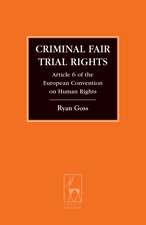Remorse, Penal Theory and Sentencing
Autor Hannah Maslenen Limba Engleză Paperback – 28 iun 2017
| Toate formatele și edițiile | Preț | Express |
|---|---|---|
| Paperback (1) | 179.35 lei 6-8 săpt. | |
| Bloomsbury Publishing – 28 iun 2017 | 179.35 lei 6-8 săpt. | |
| Hardback (1) | 467.65 lei 6-8 săpt. | |
| Bloomsbury Publishing – 25 mar 2015 | 467.65 lei 6-8 săpt. |
Preț: 179.35 lei
Preț vechi: 232.81 lei
-23% Nou
Puncte Express: 269
Preț estimativ în valută:
34.32€ • 35.62$ • 28.69£
34.32€ • 35.62$ • 28.69£
Carte tipărită la comandă
Livrare economică 15-29 martie
Preluare comenzi: 021 569.72.76
Specificații
ISBN-13: 9781509915439
ISBN-10: 1509915435
Pagini: 232
Dimensiuni: 234 x 158 x 19 mm
Greutate: 0.38 kg
Ediția:NIPPOD
Editura: Bloomsbury Publishing
Colecția Hart Publishing
Locul publicării:London, United Kingdom
ISBN-10: 1509915435
Pagini: 232
Dimensiuni: 234 x 158 x 19 mm
Greutate: 0.38 kg
Ediția:NIPPOD
Editura: Bloomsbury Publishing
Colecția Hart Publishing
Locul publicării:London, United Kingdom
Caracteristici
The author offers analysis of how normative conclusions would play out in the broader context of sentencing decisions and the guidance intended to structure them.
Notă biografică
Hannah Maslen is a Research Fellow in Ethics at the Uehiro Centre for Practical Ethics, University of Oxford, and a Junior Research Fellow at New College. She is also a James Martin Fellow at the Oxford Martin School.
Cuprins
1. Remorse and its Relevance to Penal Theory Overview of the Book Part I Retributive Arguments2. The Changed Person Argument 3. The Reduced Harm Argument Criminal Harm and Wrongdoing4. The Already Punished Argument 5. The Responsive Censure Argument 6. The Merciful Compassion Argument Part II Remorse and Sentencing Practice7. From Murder to Marijuana: A Nuanced Approach to Remorse-based Mitigation 8. The Remorseful Recidivist 9. Remorse in the Sentencing Guidelines 10. Implications for Penal Theory and Sentencing
Recenzii
[R]etributive scholars will no doubt relish and debate Maslen's highly sophisticated contribution to theory [.].
[A] very readable book...one which summarises theoretical writings in ways which are very engaging...It is like eaves-dropping at a conference of penal philosophers, with a glass of wine in your hand.
Remorse, Penal Theory and Sentencing is a clearly structured, well-written and carefully argued examination of retributive arguments for why offender remorse should be treated as a mitigating factor in sentencing. It should serve as a necessary reference point in future discussions of remorse and sentencing.
Having laid a convincing theoretical foundation for the justification of remorse as a mitigating factor for deserved censure, the second part of Maslen's monograph reads like a bucket of ice water in the face, as she shows the injustice of the current arbitrary, inconsistent, and often illogical consideration of remorse as mitigating factor in the sentencing practices of various jurisdictions.
[A] very readable book...one which summarises theoretical writings in ways which are very engaging...It is like eaves-dropping at a conference of penal philosophers, with a glass of wine in your hand.
Remorse, Penal Theory and Sentencing is a clearly structured, well-written and carefully argued examination of retributive arguments for why offender remorse should be treated as a mitigating factor in sentencing. It should serve as a necessary reference point in future discussions of remorse and sentencing.
Having laid a convincing theoretical foundation for the justification of remorse as a mitigating factor for deserved censure, the second part of Maslen's monograph reads like a bucket of ice water in the face, as she shows the injustice of the current arbitrary, inconsistent, and often illogical consideration of remorse as mitigating factor in the sentencing practices of various jurisdictions.
Descriere
This monograph addresses a contested but under-discussed question in the field of criminal sentencing: should an offender's remorse affect the sentence he or she receives?













